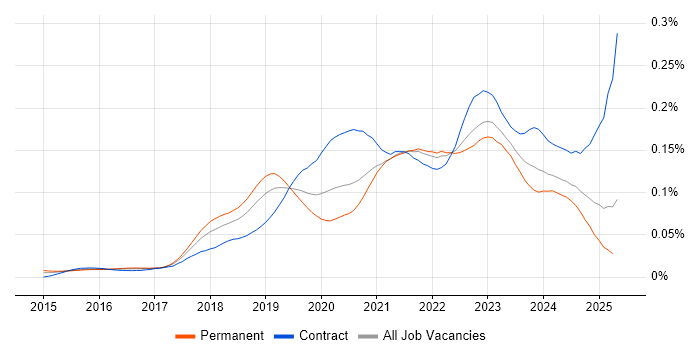Microsoft Azure Stack
UK > England
The table below provides summary statistics and salary benchmarking for jobs advertised in England requiring Azure Stack skills. It covers permanent job vacancies from the 6 months leading up to 23 February 2026, with comparisons to the same periods in the previous two years.
| 6 months to 23 Feb 2026 |
Same period 2025 | Same period 2024 | |
|---|---|---|---|
| Rank | 622 | 620 | 699 |
| Rank change year-on-year | -2 | +79 | +109 |
| Permanent jobs citing Azure Stack | 14 | 33 | 60 |
| As % of all permanent jobs in England | 0.023% | 0.076% | 0.090% |
| As % of the Cloud Services category | 0.069% | 0.20% | 0.23% |
| Number of salaries quoted | 12 | 20 | 53 |
| 10th Percentile | £67,500 | £31,875 | £36,250 |
| 25th Percentile | £68,250 | £40,938 | £47,500 |
| Median annual salary (50th Percentile) | £77,500 | £57,500 | £65,000 |
| Median % change year-on-year | +34.78% | -11.54% | -7.14% |
| 75th Percentile | £83,125 | £74,688 | £71,250 |
| 90th Percentile | £88,750 | £95,500 | £97,000 |
| UK median annual salary | £77,500 | £62,500 | £65,000 |
| % change year-on-year | +24.00% | -3.85% | -7.14% |
All Cloud Computing Skills
England
Azure Stack falls under the Cloud Services category. For comparison with the information above, the following table provides summary statistics for all permanent job vacancies requiring cloud computing skills in England.
| Permanent vacancies with a requirement for cloud computing skills | 20,390 | 16,245 | 25,752 |
| As % of all permanent jobs advertised in England | 33.53% | 37.52% | 38.46% |
| Number of salaries quoted | 11,276 | 9,997 | 21,794 |
| 10th Percentile | £29,000 | £35,000 | £31,000 |
| 25th Percentile | £40,000 | £47,231 | £41,875 |
| Median annual salary (50th Percentile) | £60,000 | £65,000 | £57,500 |
| Median % change year-on-year | -7.69% | +13.04% | -11.54% |
| 75th Percentile | £80,000 | £85,000 | £77,750 |
| 90th Percentile | £100,000 | £105,000 | £97,500 |
| UK median annual salary | £60,000 | £64,600 | £57,500 |
| % change year-on-year | -7.12% | +12.35% | -11.54% |
Azure Stack
Job Vacancy Trend in England
Historical trend showing the proportion of permanent IT job postings citing Azure Stack relative to all permanent IT jobs advertised in England.

Azure Stack
Salary Trend in England
Salary distribution trend for jobs in England citing Azure Stack.

Azure Stack
Salary Histogram in England
Salary distribution for jobs citing Azure Stack in England over the 6 months to 23 February 2026.
Azure Stack
Job Locations in England
The table below looks at the demand and provides a guide to the median salaries quoted in IT jobs citing Azure Stack within the England region over the 6 months to 23 February 2026. The 'Rank Change' column provides an indication of the change in demand within each location based on the same 6 month period last year.
| Location | Rank Change on Same Period Last Year |
Matching Permanent IT Job Ads |
Median Salary Past 6 Months |
Median Salary % Change on Same Period Last Year |
Live Jobs |
|---|---|---|---|---|---|
| South West | -8 | 7 | £77,500 | +101.30% | |
| North of England | -22 | 4 | £72,500 | +52.63% | 3 |
| North East | - | 3 | £72,500 | - | 2 |
| South East | 0 | 2 | £72,500 | +100.00% | 3 |
| London | +19 | 1 | £70,000 | -20.00% | 4 |
| North West | +4 | 1 | - | - | |
| Azure Stack UK |
|||||
Azure Stack
Co-Occurring Skills & Capabilities in England by Category
The following tables expand on the one above by listing co-occurrences grouped by category. They cover the same employment type, locality and period, with up to 20 co-occurrences shown in each category:
